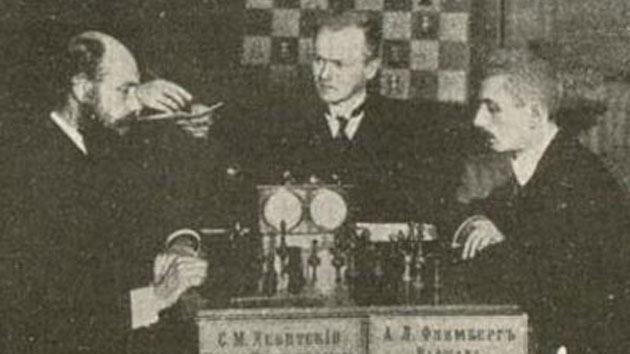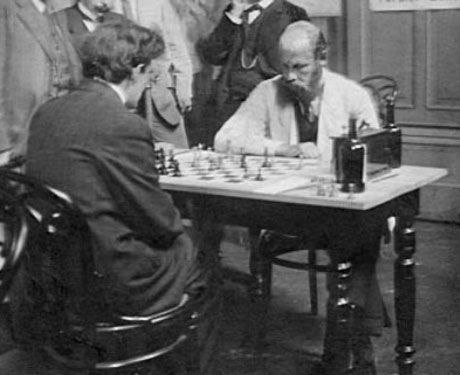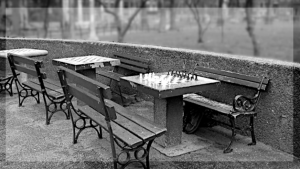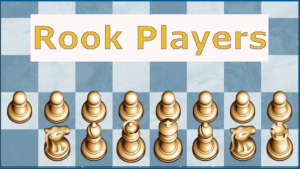
Levitsky
|
It's a curious fact that the informal title of "Master" ("Mаэстро"), the equivalent of today's International Grandmaster that was used in Russia during the late 19th-early twenieth century, was based upon the German title "Meisterdrittel" (from "master" and "third"). In order to attain the title sanctioned by the Deutschen Schachbund (DSB - the German Chess Association), one needed to win a German Congress (Hauptturnier) or an approved international tournament by winning at least one third of his games (although some say one third of his possible points*). Starting in 1909, the All-Russian competitions were included as acceptable tournaments for this purpose and the first Russian to earn this title under DSB requirements was A. Alekhine at the All-Russian Tournament in St. Petersburg in 1909. *according to the "Deutsche Schachzeitung," 1905: Stepan M. Levitsky earned the Master title at the All-Russian Amateur Tournament at St. Petersburg in 1911. Stephan Michailowitsch Lewitski proved the winner of the all-Russian There had been barely 20 DSB sanctioned titles total conferred at this time.  Stepan Levitsky playing Alexander Flamberg, 1911 All-Russian standing -Julius Sosnitsky ; seated - Peter Sabouroff
The 1911 tournament was hosted by the St. Petersburg Chess Assembly at their second-floor rooms in Nevsky 55, an historic building that was torn down over protest in 2005 and replaced with a hotel. The tournament included 40 entrants from 18 cities. Levitky's prize was 300 rubles. Nevsky 55, around 1910 In their book "Soviet Chess School," Alexander Kotov and Mikhail Yudovich tell us that "the main tournament was won by Tchigorin's pupil, Stepan Levitsky, an original chess player with a talent for good combination." Tschigorin himself, recognizing Levitsky's potential referred to him as "the hope of Russian Chess." This hope was unfortunately misplaced due to Levitsky's situation that never allowed him to capitalize on his talent through training or through playing enough high-level games. Good Year, Bad Year. Below is one of Levitsky's wins against Alekhine:
 Frank Marshall playing Stepan Levitsky, Breslau 1912. Levitsky tied for 13th place out of 18 contestants. Although he drew with Schlecter and Tarrasch and won against Meises and Przepiorka, he fell into a rather tragic situation that would ensure him an unfavorable place in the collective minds of posterity. Today, when the name Levitsky is remembered, it's for being on the wrong side of what's considered one of the finest brilliancies in chess. Frank Marshall found a remarkable move in what had been termed his "Shower of Gold" game. Below is the game with Marshall's own notes from "My Fifty Years of Chess," as published in "Chess Review," March, 1942. The Alekhine-Levitky match. _________________________________________________________________________ First a few words about Alekhine and the 1909 All-Russian Tournament:
Alexander Alekhine was only 16 when he won this major tournament. He scored +12-2=2, meeting the requirements for the master title. This was the first Russian tournament to qualify. Previously, Russia has to send players to outside its borders for a chance at a title. For winning Alekhine received a certificate (pictured below) and the 27" porcelain vase, blue and white with gold handles, with the Tzar Nicholas II's initials and emblem guilded on its side, pictured on the left. This vase must have been his prized possession since, even when he had to abandon most other possessions, he always kept it with him. According to Alekhine himself in a 1937 interview, "This vase was the only thing I was allowed to take out in 1921, when I left Soviet Russia." ................................................................................. Alekhine had to leave for home missing the ceremony during which all prizes were conferred and only received his own prizes later. The 1909 All-Russian Amateur Tournament apparently was considered the minor tournament of the 1909 St. Petersburg International since Lasker wrote his book on the Tournament, "His Majesty the Czar Nikolaus deigned to give 1000 Rbls. to strengthen the means at the disposal of the Congress and to donate also a magnificent vase of the Imperial porcelaine manufacture as a first prize for the all Russian Minor Tournament." Still, this tournament included players such as Peter Romanovsky (just 3 months older than Alekhine), Gersz Rotlewi, Sergey Lebedev, Boris Verlinsky and Stefan Izbinsky. 1909 All-Russian, St. Petersburg  First row (standing in the back): Dawid Daniuszewski, Sergey Znosko-Borovsky (older brother of Eugene; one of the organizers), Boris Verlinsky.
Elim Pavlovich Demidov, 3rd Prince of San Donato, possibly the richest man in the world at the turn-of-the-century, owned factories and mines in Nizhny Tagil in the Urals. A playboy, his involvement in the family business was minimal. He lived for hunting and chess. He wrote a book, "Hunting Trips in the Caucasus" and financed some of the All-Russian tournaments. It seems he also helped Levitsky who worked at his mines and helped finance the Alekhine-Levitsky match. (However, some sources claim the mine authorities did all in their power to discourage Levitsky from playing, viewing his chess playing as an interference). A curious footnote: _________________________________________________________________________ Alekhine won his match against Levitsky with a convincing 7-3 result. None of the games ended in draws, but the conclusion wasn't so evident at the beginning. Alekhine won the first 3 games, making the match look one sided. But Levitsky rallied, winning the next 2. Alekhine won game 6 but Levitsky won game 7, leaving the score at 4-3 in Alekhine's favor. Then Levitsky fell apart and Alekhine won the last 3 in a row, finishing as he started. Below are Levitsky's 3 wins. the rest of the games can be found at chessgames.com.
How important Alekhine considered this match is reflected in the fact that he annotated every game for a local paper. After losing the match to his much younger opponent, Levitsky gave blindfold simuls in the cities of Vyatka, Vologda and Ryazan. Back to the Beginning. Stepan Michailowitsch Levitsky was born on April 13, 1876, the fourth of nine children, in the city of Serpukhov, about 50 miles south of Moscow. He attended elementary school in Serpukhov and high school in Moscow. He learned chess at 11 but had few opportunities to learn from stronger players. His family moved frequently. While living in Vyatka, a city just west of the Urals, his father organized a chess club.  The platinum business in the Urals during 1911, thanks to the high price of the metal, continued to develop and the production increased. The leading position is held by the Southern Verebotur district, including the platinum mines of the Nizhni-Tagil factories and the mines of the Platinum Company,
At this time Levitsky finally found work, but it was as a technician at the platinum mines owned by Prince Elim Demidov-St. Donato in the Perm region in the Urals. The mines employed about 1300 workers while the associated factories employed another 3500. This was considered the hinterland where at the time chess was more spoken about than played. Levitksy played no real chess in the Urals. In 1902, at Tschigorin's insistance, he was invited to play in the All-Russian Tournament set for the following year. He entered "under the flag" of the Nizhny Tagil mines. 1903 All-Russian Tournament in Kiev
 back row: Rabinovich,Izbinsky, Kylomzin, Lebedev, Znosko-Borovsky, Levitsky, Kalinsky, Ben'ko, Lowtzky front row: Rubinstein, Vengerov, Salwe, Chigorin, Loxting, Count Plater, Yurevich, Bernstein, Schiffers, Duz-Chotimirsky (Plater was the tournament patron, Loxting and Vengerov were tournament officials.) Levitsky's game with Fedor Dus-Chotimirsky
Levitsky played in the 1905-06 All-Russian that took place from December 22 to January 16 in St. Petersburg, placing only 11/17 (+5-8=2). However in their individual game he beat Benjamin Blumenfeld who had tied with Akiba Rubinstein for second place (Georg Salwe won the tournament).  In 1907 Semyon Alapin, the master from St. Petersburg, beat Levitsky convincingly in a short match that lasted six games - winning five games, drawing one, although previously that year in a tournament in St. Petersburg, Levitsky scored 5/7 (just behind Eugene Znosko-Borovsky) compared to Alapin's 1.5/7.  Levitsky in 1913 We can skip ahead to 1914, having already talked about the intervening years. 1914 was Levtisky's final active year. Levitsky played in the All-Russian Tournament from Dec. 23, 1913 to Jan. 17, 1914. The tournament celebrated the 10 year anniversay of the St. Petersburg Chess Assembly. Levitsky only placed 13th out of the 18 participants (from 7 different cities) but the field was strong. Alehkine and Nimzovitch shared first place. The winner of the tournament earned an invitation to the (now famous) 1914 St. Peterburg Master's Tournament. Since Alekhine and Nimzovitch ended up with the same number of points (13.5/17), they played 2 tie-breaking games. Both games ended in draws, so the committee voted to send both to the major tournament.  1913-1914 All-Russian at St. Petersburg Levitky developed a gastic ulcer, then stomach cancer. He was invited to participate in the USSR Championship in Petrograd in July of 1923. Although he showed up fully intending to play, he has a relapse and was hospitalized at the Mariinsky Hospital in St. Petersburg throughout the month of July. On July 25, Fedor Dus-Chomirsky gave a 24 board simul, donating the proceeds to Levitsky. Upon his release, he returned to Nizhny Tagil. He gave 2 blindfold simuls in the city of Yekaterinburg between then and when he died on April 3, 1924, just 10 days shy of his 48th birthday. Quite interesting are Fedor Dus-Chomirky's thoughts on Levitsky from his Memoires (published in translation by member Spektrowski starting HERE ) :
Thanks to Spektrowski, who quite possibly maintains the best chess blog on this site, for help with Russian text and for his insight into the political, cultural and chess climate in pre-Soviet Russia. |






